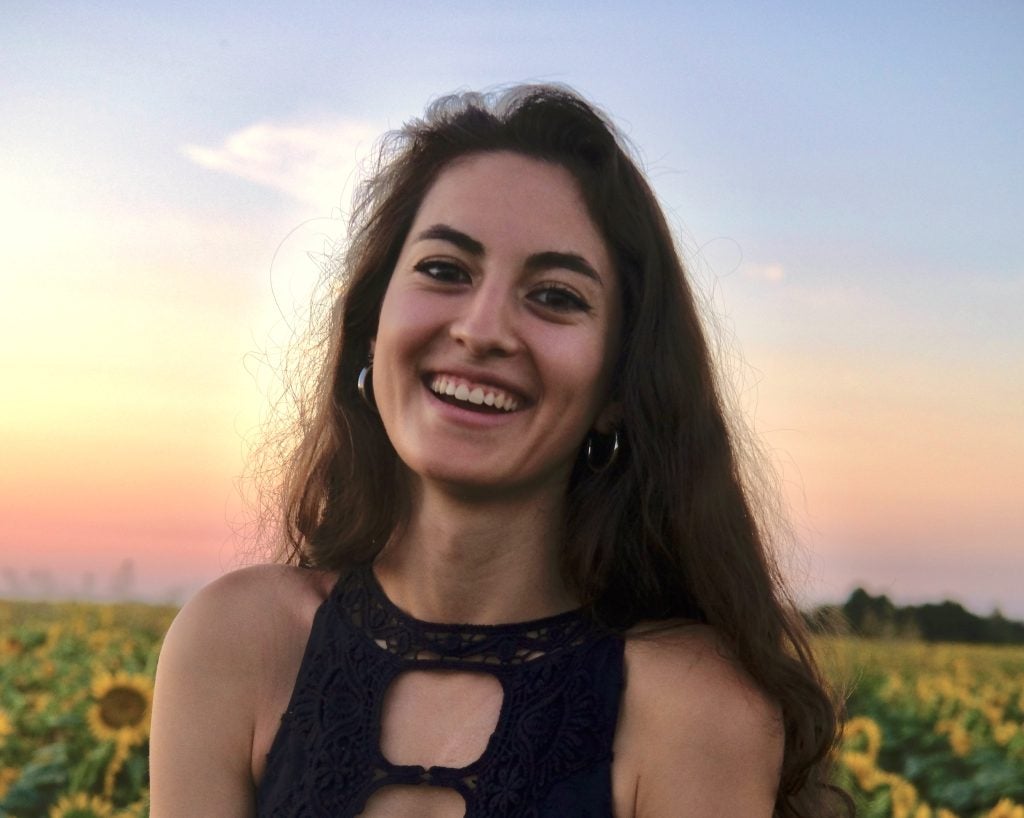“Find the Joy”: Two Graduating Interdisciplinary M.A. Students Offer Personal and Professional Reflections From Time at Georgetown University
Meet Ivett Arellano and Robin Calleja: two graduating Master of Arts students in interdisciplinary programs at the Graduate School from the class of 2023. In this Q&A, they reflect on personal and professional insights from their time on the Hilltop and share their advice for incoming graduate students.
Ivett Arellano (G’23)
Master of Arts in Educational Transformation
Concentration in Education Advocacy & Policy

Ivett Arellano (G’23)
Q. How has your experience in the Educational Transformation program prepared you for your future career?
A. The Educational Transformation program is unique because of its holistic and forward-thinking approach to education advocacy and policy. As a result, I am equipped to enter the space of education policy not only with professional skills but with extensive knowledge to analyze the world around me through a critical and social justice lens that will apply to any profession I find myself in.
Q. What challenges did you face during your graduate studies, and how did you overcome them?
A. My graduate studies came with its fair share of challenges: imposter syndrome, time management, perfectionism and assignments that stretched my hard and soft skills. To overcome these challenges, I prioritized self-care and leaned on my support system. I know (now) that I cannot perform at my best if I am burned out, so if I need to take the night off, ask for an extension or reach out to loved ones, it’s okay!
Q. How has your graduate education impacted your personal and professional growth?
A. As a graduate student in Educational Transformation, I was challenged to build my vision of educational justice and equity and discover what that looked like at various policy levels. This type of thinking lent itself to my research, writing and analysis, but also merged with my personal growth as I grew more conscious about systems of injustice that touch our daily lives and explore the actions I can take to challenge them.
“Graduate school is not an easy feat, and I am grateful I had my brilliant cohort and Dr. Kristin Sinclair to lean on in addition to my loved ones. My advice to incoming graduate students: find people on campus to add to your network that provide support, motivation and guidance.”
– Ivett Arellano (G’23)
Q. What accomplishments are you most proud of during your time at Georgetown?
A. Aside from my academic growth, I am very proud of the role I stepped into as Lead Organizer at EmpowerEd, a DC-based teacher advocacy non-profit. The DC education system and its politics are not the easiest to navigate, especially for a non-DC native or resident. However, with the encouragement of Scott Goldstein, EmpowerEd’s Founder and Executive Director, our amazing EmpowerEd staff and teacher fellows, I have grown as an advocate for DC educators through research, lobbying efforts and community organizing.
Q. What are your plans after graduation?
A. After I take a short post-grad break to reset, I will continue my work in K-12 education policy analysis in DC at an organization or company that strives to promote and enact educational equity for students and/or teachers!
Robin Calleja (G’23)
Master of Arts in Communication, Culture & Technology

Robin Calleja (G’23)
Q. How has your experience in the Communication, Culture & Technology (CCT) program prepared you for your future career?
A. My time in the CCT program affirmed my strong interest and passion for media studies, particularly as it relates to popular culture, online communities and participatory culture. This program is often described as a choose-your-own-adventure, and this unique aspect of our intellectual community helped me explore the different paths I can take as an aspiring academic through my coursework and interactions with faculty and fellow graduate students.
Q. What challenges did you face during your graduate studies?
A. After finishing my undergraduate studies in 2018, I was diagnosed with major depressive disorder. Although it’s something that I’ve struggled with even before coming to Georgetown in 2021, I think juggling it with my grad school journey added another layer to the challenges. One of the things I remember from orientation was when Dr. Matthew Tinkcom mentioned in his welcoming remarks a silent third “C” in “CCT,” which stands for “community.” He really set the tone for a lot of us that day, and it shows in the tight-knit nature of our program and how approachable the faculty, staff and students are. Learning how to lean onto others when I need to was one of the ways that I overcame the biggest challenges during my graduate studies.
Q. How has your graduate education impacted your personal and professional growth?
A. One of the biggest takeaways from my graduate experience is how applicable interdisciplinarity is not just within different academic fields but also in professional, and even personal, contexts. Students and faculty in the CCT program come from a variety of backgrounds: computer science, social sciences, arts and humanities. Interacting with colleagues from different fields fosters an environment where we can all contribute our expertise and learn from peers’ strengths when it comes to group projects and intellectual discussions.
Our first graded assignment for CCTP-505 (one of our core courses) was to build an avatar that represents our respective research interests, and I never expected my first major project in grad school to be an art project. Growing up queer, there was a time when I felt more myself behind a computer than in a playground and more at home in a digital avatar than in my physical body. This sparked my fascination in how identities are constructed online. This creative and playful way of learning and conveying ideas has helped me a lot with how I have approached the research projects I’ve worked on, as well as how I facilitated recitation sections and interacted with my students as a teaching assistant.
“Being in such a supportive learning environment has helped me come to terms with the fact that we all need guidance from time to time.”
– Robin Calleja (G’23)
Q. What accomplishments are you most proud of during your time at Georgetown?
A. Two of my proudest accomplishments are having my first peer-reviewed article, “Screaming at the Television,” published by Gnovis Journal in spring 2022 and presenting my first conference paper at Northwestern University this past fall. In both academic works, I had the opportunity to incorporate the five things I am most passionate about: qualitative research, media studies, critical theory, popular culture and storytelling. These projects encapsulate the essence of what I have learned in graduate school.
Q. What advice would you give to incoming graduate students?
A. The best advice that I received at orientation was from one of my professors, Dr. Jeanine Turner: always try to tie each of your research papers and projects to the skills and knowledge that you would like to develop during your time in graduate school. It’s something that I have had to constantly remind myself throughout my time here, and I think it’s one of the things that have made my grad school experience so meaningful. We all have different dreams, passions and motivations. Regardless of what they are, I think remembering and reflecting on them can help us stay on course and remain focused on our goals.
Lastly, always try to find the joy in whatever you’re doing and find the time to explore DC. It sounds cheesy and cliché, but the reality is that your time here is very limited, so make the most out of your graduate school experience!
Q. What are your plans after graduation?
A. Right now, I am applying and interviewing for various positions in communications, research, teaching and higher education. Regardless of where I end up, in the immediate months following graduation, my most definitive plan is to apply to Ph.D. programs in media studies and sociology in November and December.
– By Tala Hamdani (G’23) and Jessica Marr (G’19)
